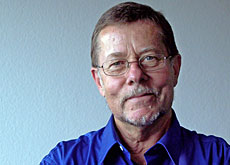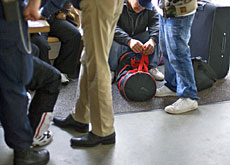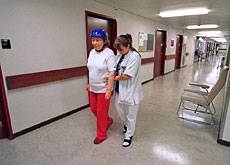Expert highlights untapped migrant resource

An international expert says Switzerland is shooting itself in the foot by failing to recognise and absorb the tens of thousands of migrants working illegally in the country.
Manuel Carballo claims that far from being “charity cases”, the majority of unofficial migrants in Europe represent a valuable economic and social resource that is largely going to waste.
The comments by the executive director of the Geneva-based International Centre for Migration and Health (ICMH) come hot on the heels of a similar warning last month by the country’s top aid official.
Speaking ahead of nationwide votes on tougher foreigner and asylum laws, Walter Fust, the head of the Swiss Agency for Development and Cooperation, feared the country was losing sight of its future employment needs.
Carballo told swissinfo that unauthorised migrant workers in Switzerland – estimated by the Federal Migration Office at up to 100,000 – represented an untapped source of contributions to health insurance schemes and the ailing state pension system.
He also noted that the role played by migrants in the service and domestic sectors, especially in terms of childcare and care of the elderly, was seriously undervalued. With a shortage of crèche places and a rapidly ageing population, this could no longer be ignored, he said.
“Unofficial migrants are picking up the load that society would otherwise have to assume – but at far less cost,” he said. “They are rarely a burden: they work longer hours for less pay, are not unionised and do not claim or get the benefits others do.”
“I don’t think there’s any understanding among the public in general of the role they play economically and socially,” added Carballo. “I think there is still this feeling that migrants are charity cases when in fact the majority are working and not asking for unemployment benefits.”
No authorisation
According to an ICMH study carried out among illegal migrants in Geneva two years ago, most were high-school graduates and in many cases were over-qualified for the work they were doing.
Carballo says Switzerland is not alone in failing to come to terms with its hidden labour force. He claims that throughout Europe, governments have done little to absorb the influx of illegal migrant workers, preferring to turn a blind eye rather than attempt any form of proactive integration.
“I don’t think it’s a coincidence that most countries don’t really exclude illegal migrants,” he said. “For the most part, unofficial migrants are tolerated because both politicians and employers understand how important they are for the economy.”
Carballo cites the example of Geneva where the children of illegal migrants are expected to go to school and receive subsidised health insurance. Yet their parents, whose whereabouts are known to the authorities, remain outside the system.
“Migration is a fundamental part of today’s global and national economic system, and it needs to be better planned and managed,” he said. “It would be very short-sighted of politicians and employers, and society in general, not to recognise this new reality in which we are all living.”
swissinfo, Adam Beaumont in Geneva
An ICMH study of illegal migrants in Geneva two years ago highlighted some of the difficulties they faced.
Most were not covered by any form of health insurance and those that sought it were generally refused policies by insurance companies.
More than three-quarters of those questioned feared they would be denounced if they approached social services for help.
Four out of five said they were depressed and many reported problems of a psychosomatic nature such as ulcers, back pains, chronic headaches, loss of appetite and sleep disorders.

In compliance with the JTI standards
More: SWI swissinfo.ch certified by the Journalism Trust Initiative




You can find an overview of ongoing debates with our journalists here. Please join us!
If you want to start a conversation about a topic raised in this article or want to report factual errors, email us at english@swissinfo.ch.